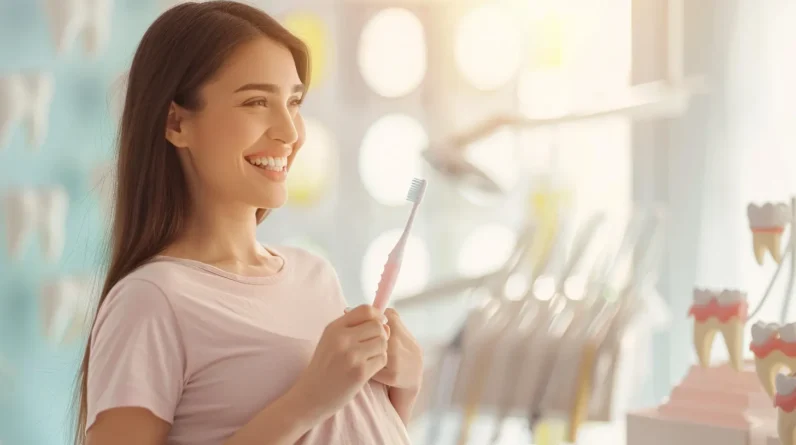
As expectant mothers, we’re more prone to oral health issues, with hormonal fluctuations increasing our risk of gum disease. To guarantee a healthy smile throughout pregnancy and beyond, we must take proactive steps. We should schedule a dental check-up before conceiving to address existing issues, then commit to regular visits and good oral hygiene practices like brushing, flossing, and using mouthwash. By prioritizing our dental health, we’ll reduce the risks to our baby’s health and our own.
By digging deeper, we’ll uncover more tips and insights to maintain a healthy, happy smile throughout this journey.
Dental Health Before Pregnancy
As we prepare for pregnancy, it’s important that we schedule a dental check-up to address any existing dental issues and promote excellent oral health. This pre-pregnancy dental care is vital for maintaining healthy teeth and gums. We should inform our dentist about our plans for pregnancy and any medications we’re taking. By doing so, we can guarantee our dentist takes necessary precautions during our dental care. Regular dental visits every 6-12 months are recommended for top oral health.
Early detection and treatment of dental problems before pregnancy can help maintain good oral health. By taking proactive steps, we can ensure a healthy smile throughout our pregnancy and beyond.
Pregnancy and Oral Health Risks
During pregnancy, hormonal fluctuations can wreak havoc on our oral health, increasing the risk of gum problems like gingivitis and periodontal disease. As pregnant women, we’re more susceptible to gum disease, which can lead to premature birth with low birth weight. Research has shown a direct link between untreated dental issues and potential risks to our baby’s health. It’s imperative we prioritize our dental health before childbirth to guarantee a healthy pregnancy and baby. We must manage our oral health to avoid dental problems and associated risks. Regular dental check-ups and good oral hygiene practices are key to preventing gum disease and promoting a healthy pregnancy. By taking control of our oral health, we can reduce the risks and give our baby the best possible start in life.
Maintaining Good Oral Hygiene
We must commit to a rigorous oral hygiene routine to prevent gum disease and tooth decay, which involves brushing our teeth at least twice daily for 2 minutes with fluoride toothpaste. As pregnant women, we’re more prone to oral health issues due to hormonal changes. To maintain good oral hygiene, we should also floss daily and use a mouthwash recommended by our dentist. When brushing, we should angle our toothbrush at 45° and use a circular motion to clean along the gum line for effective plaque removal.
Don’t forget to brush our tongues and all tooth surfaces to reduce bacteria and keep our breath fresh. Regular dental appointments are essential for monitoring our oral health and addressing any issues promptly, ensuring we receive necessary treatment during pregnancy.
Managing Morning Sickness Effects
Morning sickness can wreak havoc on our oral health, making it more challenging to maintain good oral hygiene practices, especially when vomiting and nausea make brushing and flossing a difficult task. To combat this, we should rinse our mouths with water or mouth rinse after vomiting to protect our teeth from stomach acids. If morning sickness is affecting our ability to brush, we can consider using bland-tasting toothpaste.
It’s crucial to uphold good oral hygiene practices despite morning sickness to prevent dental issues. We should seek recommendations from our dentist or hygienist on managing oral care during this time. By taking these steps, we can guarantee our oral health remains strong, even when morning sickness is at its worst.
Vitamin D and Calcium for Health
As we navigate the complexities of pregnancy, it’s essential to prioritize our intake of vitamin D and calcium, two nutrients that play a critical role in supporting our health and that of our developing baby. Vitamin D is important for calcium absorption and utilization, which is essential for both maternal and fetal bone health. To make sure sufficient intake, we should consume dietary sources like fatty fish, egg yolks, and fortified foods, and consider supplementation under the guidance of our healthcare providers.
We should take advantage of natural sunlight exposure to boost our vitamin D levels. By prioritizing our calcium intake from sources like dairy and leafy greens, we can support healthy bone development in our baby and maintain our own maternal health.
Conclusion
As we near the finish line of our pregnancy journey, we’ve learned that a healthy smile is just as vital as a healthy baby bump. By prioritizing dental care, we’ve dodged a million potential problems, from gum disease to preterm labor. With our teeth and gums thriving, we can finally breathe a sigh of relief – and flash a radiant smile to match our glowing complexion.







